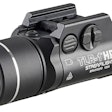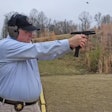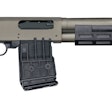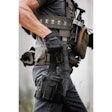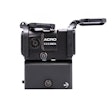The death of a man shot by police with a Taser stun gun in Philadelphia has caused civil liberties groups to question the safety of weapons considered nonlethal.
Many police departments nationwide have added weapons like pepper spray, electronic shockers, rubber bullets and net guns to their arsenals in recent years, in an effort to subdue suspects without firing a gun.
Now, groups such as the ACLU and Amnesty International are calling for closer scrutiny of such weapons. Amnesty International has urged law enforcement and correctional agencies to suspend use of the weapons until an independent inquiry is conducted, spokeswoman Gwen Fitzgerald said.
In the Philadelphia incident, Anthony Spencer, 35, was standing outside his home naked and brandishing a 7-inch knife when police arrived Wednesday. Officers used pepper spray in an effort to subdue him but it didn't work, so they used the Taser 50,000-volt stun gun, police said.
The Taser fires two projectile darts, connected to the weapon by wires, that can reach a subject up to 21 feet away. An electrical charge temporarily overrides the central nervous system; if the suspect continues to resist, the officer can deliver a second charge by pulling the trigger.
After the 6-foot-tall, 280-pound man was dropped by the current, he was handcuffed and placed in a patrol wagon for the ride to the hospital. He was conscious at the time of his arrest but died on the way to the hospital. Preliminary tests showed he had cocaine in his system, police said. No cause of death has been determined, and whether the drug played a part will not be known until autopsy reports and toxicological tests are analyzed.
The incident was the first such fatality in Philadelphia since police began using the Taser device last year, authorities said. Other fatalities have been reported in Taser-assisted arrests in Florida, California and other states, but none have been blamed on the Taser itself, said Steve Tuttle of Taser International, which sells the weapon to 1,200 police departments worldwide.
``The Taser is an alternative to a firearm that has saved thousands of lives,'' he said. ``Our biggest problem is a lack of knowledge about how it works.''








